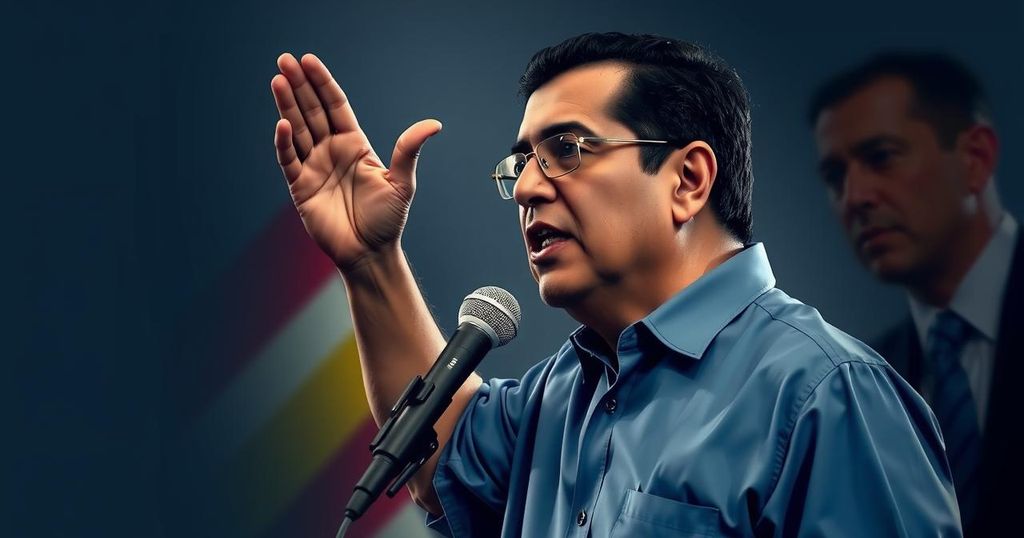U.S. Recognition of Edmundo Gonzalez as Venezuela’s President-Elect Amid Election Disputes

The U.S. recognized Edmundo Gonzalez as Venezuela’s “president-elect” on Tuesday, months post-July elections claimed by Maduro. Secretary of State Blinken emphasized respect for voter will. The credibility of Maduro’s victory remains contested amid electoral disputes and lack of transparency, with Gonzalez asserting he had double Maduro’s votes. Recent political shifts among allied leaders reflect regional tensions regarding the election’s legitimacy.
On Tuesday, the U.S. government officially recognized Venezuelan opposition candidate Edmundo Gonzalez as the “president-elect” of Venezuela, a status given months after President Nicolas Maduro declared victory in the disputed election held on July 28. U.S. Secretary of State Antony Blinken made the announcement on social media, emphasizing the importance of respecting the electoral outcomes and the will of the Venezuelan people. Although the Biden Administration has stated that Gonzalez received more votes than Maduro, it has stopped short of formally recognizing him as the legitimate president. The Venezuelan National Electoral Council, whose members are loyal to Maduro, announced his victory soon after the polls closed, yet failed to disclose specific voting data that would provide clarity about the election’s fairness. In contrast, the opposition coalition compiled and shared voting data from approximately 80% of electronic voting machines, suggesting that Gonzalez actually received double the votes of Maduro. Responding to the U.S. recognition, Gonzalez expressed gratitude for affirming the collective desire of Venezuelans for change, as he has faced persecution and fled to Spain after a warrant for his arrest was issued. Venezuelan Foreign Minister Yvan Gil responded critically to Secretary Blinken, labeling him and his administration as failures while side-stepping the issue of the election results. Maduro’s government has consistently dismissed appeals from various nations, including the U.S. and Colombia, to provide detailed records of the election, which has prompted doubts regarding its legitimacy. Notably, experts from the U.N. and the Carter Center pointed to the lack of credibility in the official results but did not fully endorse Gonzalez’s claims of victory. Recently, Colombian President Gustavo Petro, initially supportive of the July elections, changed his stance, characterizing the elections as a “mistake” that was not conducted fairly. The rapid decline of diplomatic efforts by leftist leaders to mediate the situation has left Venezuela’s political landscape polarized, especially as the next presidential term commences on January 10, with Maduro already positioned for re-inauguration.
The political crisis in Venezuela has been ongoing for years, marked by severe economic hardships and a humanitarian crisis. The country has been polarizing under the leadership of President Nicolas Maduro, whose election victories have been repeatedly challenged both domestically and internationally. The July 28 election, claimed by Maduro to be fair, was met with skepticism, as the absence of transparent vote counting raised flags about its legitimacy. The recognition of Gonzalez by the U.S. adds a significant diplomatic layer to the ongoing conflict between Maduro’s administration and the opposition. The shifting positions among Latin American leaders signal a broader struggle over the recognition of electoral legitimacy in the region.
In conclusion, the United States’ recognition of Edmundo Gonzalez as the “president-elect” of Venezuela underscores the ongoing contention surrounding the legitimacy of the July elections won by Nicolas Maduro. Despite international calls for transparency and accountability, the Maduro administration has continued to reject assertions of electoral fraud. The evolving dynamics of regional politics, including shifts in support from leaders like Colombian President Gustavo Petro, highlight the complex and fractured nature of Venezuela’s political environment as the country approaches a new presidential term.
Original Source: www.voanews.com








